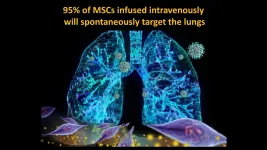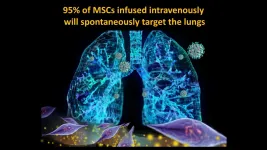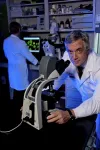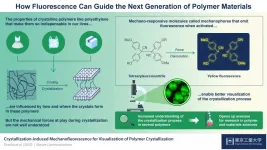Researchers regenerate deactivated catalyst in methanol-to-olefins process
2021-01-05
(Press-News.org) MTO process, which was first commercialized in 2010, is a catalytic process converting methanol, which is typically made from coal, natural gas, biomass, and CO2, over SAPO-34 zeolite catalyst. It's becoming one of the main streams for producing light olefins, including ethylene and propylene, from non-oil resources.
One of the major challenges in MTO is the rapid deactivation of zeolite catalyst due to the coke deposition.
In industrial practices, a fluidized bed reactor-regenerator configuration is normally used in order to maintain the continuous operation, in which air or oxygen is usually input to burn off the deposited coke to restore the catalyst activity in the regenerator. This involves the transformation of coke species to CO2, with a substantial fraction of carbon resource being converted to low-value greenhouse gas.
A research group led by Prof. YE Mao and Prof. LIU Zhongmin from the Dalian Institute of Chemical Physics (DICP) of the Chinese Academy of Sciences regenerated deactivated catalyst in industrially important methanol-to-olefins (MTO) process by directly transforming the coke deposited on the zeolite catalyst to active intermediates rather than burning off to carbon oxide.
This work was published in Nature Communications on Jan. 4.
It was previously shown that MTO follows the hydrocarbon pool mechanism, i.e. the light olefins are favorably formed with the participation of active intermediate species, or called hydrocarbon pool species (HCPs), during the reaction. The HCPs will evolve into coke species that deactivate catalyst.
By using the density functional theory (DFT) calculations and multiple spectroscopy techniques, this team showed that naphthalenic cations, amongst HCPs, were highly stable within SAPO-34 zeolites at high temperature, and steam cracking could directionally transform the coke species in SAPO-34 zeolites to naphthalenic species at high temperature.
This technology not only recovers the catalyst activity but also promotes the formation of light olefins owing to the synergic effect imposed by naphthalenic species.
Furthermore, the researchers verified this technology in the fluidized bed reactor-regenerator pilot plant in DICP with industrial-alike continuous operations, achieving an unexpectedly high light olefins selectivity of 85% in MTO reaction and 88% valuable CO and H2 with negligible CO2 in regeneration.
This technology opens a new venue to control the selectivity of products via regeneration in industrial catalytic processes.
INFORMATION:
[Attachments] See images for this press release:
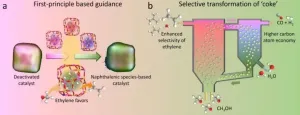
ELSE PRESS RELEASES FROM THIS DATE:
2021-01-05
Dr. Camilo Ricordi, director of the Diabetes Research Institute (DRI) and Cell Transplant Center at the University of Miami Miller School of Medicine, and his team of international collaborators are reporting the results of a groundbreaking randomized controlled trial showing umbilical cord-derived mesenchymal stem cell (UC-MSC) infusions safely reduce risk of death and quicken time to recovery for the most severe COVID-19 patients. Dr. Ricordi's peer-reviewed paper has just been published in STEM CELLS Translational Medicine (SCTM) January 2021.
The clinical trial, authorized by the FDA last ...
2021-01-05
Dr. Camilo Ricordi, director of the Diabetes Research Institute (DRI) and Cell Transplant Center at the University of Miami Miller School of Medicine, and his team of international collaborators are reporting the results of a groundbreaking randomized controlled trial showing umbilical cord-derived mesenchymal stem cell (UC-MSC) infusions safely reduce risk of death and quicken time to recovery for the most severe COVID-19 patients. Dr. Ricordi's peer-reviewed paper has just been published in STEM CELLS Translational Medicine (SCTM) January 2021.
The clinical trial, authorized by the FDA last April, was initiated by The Cure Alliance, a 501(c)(3) non-profit organization of research scientists founded ten years ago by Dr. Ricordi for scientists ...
2021-01-05
Like any other plant, Arabidopsis thaliana or mouse-ear cress, needs nitrogen to survive and thrive. But, like maize, beans and sugar beet, it prefers nitrogen in the form of nitrate, growing better on nitrate rich soil. Whereas, pine and rice for example preferentially grow on ammonium nutrition, another form of the key macronutrient nitrogen. If the concentration or the availability of the different forms of nitrogen fluctuate, plants have to adapt quickly. "One of the most important questions is, what is the role of plant hormones in adaptation to the nitrogen availability? How do the machineries within a plant cope with their changing environment?" asks Eva Benková, developmental biologist and Professor at the Institute of Science and Technology (IST) Austria.
Finding the balance
In ...
2021-01-05
University of Miami Miller School of Medicine researchers led a unique and groundbreaking randomized controlled trial showing umbilical cord derived mesenchymal stem cell infusions safely reduce risk of death and quicken time to recovery for the severest COVID-19 patients, according to results published in STEM CELLS Translational Medicine in January 2021.
The study's senior author, Camillo Ricordi, M.D., director of the Diabetes Research Institute (DRI) and Cell Transplant Center at the University of Miami Miller School of Medicine, said treating COVID-19 with mesenchymal stem cells makes sense.
Results: treatment group vs. ...
2021-01-05
Inspired by the color-changing skin of cuttlefish, octopuses and squids, Rutgers engineers have created a 3D-printed smart gel that changes shape when exposed to light, becomes "artificial muscle" and may lead to new military camouflage, soft robotics and flexible displays.
The engineers also developed a 3D-printed stretchy material that can reveal colors when light changes, according to their study in the journal ACS Applied Materials & Interfaces.
Their invention is modeled after the amazing ability of cephalopods such as cuttlefish, octopuses and squids to change the color and texture of their soft skin for camouflage and communication. This is achieved by the ...
2021-01-05
In modern times, manufacturers produce highly specialized materials for a wide array of uses, called polymers. Polymers have a variety of purposes owing to their versatile properties, ranging from being used in construction due to their high tensile strength and resistance to manufacturing plastic bags that require more lightweight, flexible materials, such as nylon or polyethene.
These differences between the properties of different polymers stems from their internal structure. Polymers are made up of long chains of smaller sub-units, called "monomers." Crystallization occurs when crystalline polymers are melted, then cooled down slowly, which enables the chains to organize themselves into neatly arranged ...
2021-01-05
Grasslands are managed worldwide to support livestock production, while remaining natural or semi-natural ones provide critical services that contribute to the wellbeing of both people and the planet. Human activities are however causing grasslands to become a source of greenhouse gas emissions rather than a carbon sink. A new study uncovered how grasslands used by humans have changed our climate over the last centuries.
Grasslands are the most extensive terrestrial biome on Earth and are critically important for animal forage, biodiversity, and ecosystem services. They absorb and release carbon dioxide (CO2), and emit methane (CH4) from grazing livestock and nitrous oxide (N2O) from soils, especially when manure or ...
2021-01-05
A new study out of the University of Chicago Medicine following young adult drinkers for 10 years has found that individuals who reported the highest sensitivity to alcohol's pleasurable and rewarding effects at the start of the trial were more likely to develop an alcohol use disorder (AUD) over the course of the study.
Moreover, when retested on their responses 10 years later, those who became alcoholics had the highest levels of alcohol stimulation, liking and wanting - and these were heightened compared to their baseline with no signs of tolerance to these pleasurable effects.
The research, published on Jan. 5 in the American Journal of Psychiatry, followed a ...
2021-01-05
Bird diets provide a real treasure for research into the distribution and conservation of their prey, such as overlooked and rare bush-cricket species, point out scientists after studying the diet of the Eurasian Eagle Owl (Bubo bubo) in southeastern Bulgaria.
In their END ...
2021-01-05
Chemotherapy for breast cancer costs the UK economy more than £248 million annually, including 'out-of-pocket' personal costs of more than £1,000 per patient - according to new research from the University of East Anglia.
A new study published today is the first to investigate the total non-healthcare cost of chemotherapy to the UK.
It includes the cost of lost productivity, work absence, and personal costs such as paying for transport and parking for treatment, the cost of wigs and new bras, and over the counter medications.
The UEA research team say that better targeting of treatment could help avoid placing unnecessary costs upon patients, their caregivers and wider society.
Prof Richard Fordham, from UEA's ...
LAST 30 PRESS RELEASES:
[Press-News.org] Researchers regenerate deactivated catalyst in methanol-to-olefins process

